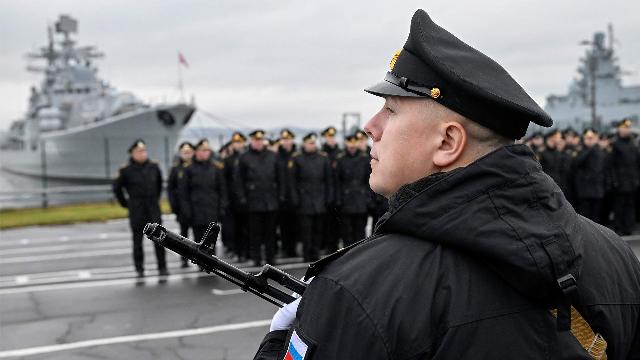The tasks of protecting the country's coast and the Northern Sea Route were worked out
A detachment of ships of the Russian Navy returned to Severomorsk, having made a long-range Arctic campaign. During the voyage, the sailors conducted a number of activities aimed at ensuring the protection of Russia's interests in the Arctic, including the route of the Northern Sea Route. This Arctic campaign was the thirteenth in a row. Experts note that in the current military-political situation, it is important to have trained forces that will ensure Russian sovereignty over the Arctic region.
Russia's interests in the Arctic
The detachment included the large anti-submarine ship Vice Admiral Kulakov, the large amphibious ship Alexander Otrakovsky, the rescue tugboat Altai and the large marine tanker Sergei Osipov, the Russian Defense Ministry said.
The commander of the Northern Fleet, Vice Admiral Konstantin Kabantsov, congratulated the North Sea sailors who took part in the campaign on successfully solving all tasks and returning home. He noted that the completed campaign proves once again that the Northern Fleet is successfully solving the tasks of protecting Russia's national interests in the Arctic region.
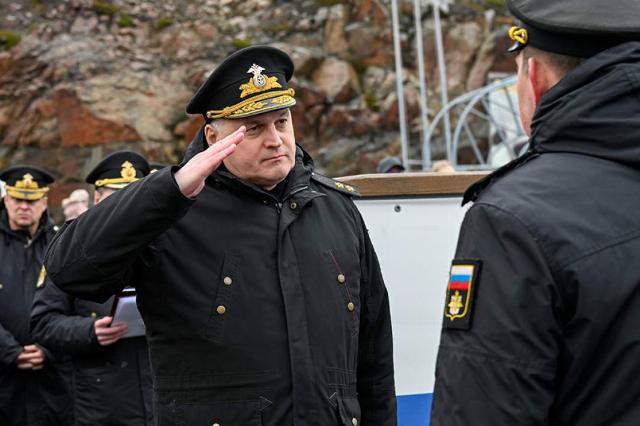
The commander of the Northern Fleet, Vice Admiral Konstantin Kabantsov, during a meeting of the crews of the ships of the Northern Fleet support unit after the completion of the 13th Arctic long-range cruise through the seas of the Arctic Ocean
Image source: Photo: TASS/Ice Class
During the campaign, the ships of the Northern Fleet conducted more than 80 naval combat and ship exercises, and in 13 episodes the use of naval weapons was practiced.
During them, combat training tasks were set to ensure the safety of maritime navigation and other types of maritime economic activity of the Russian Federation in the Arctic zone, as well as to defend the island and continental territories of Russia in the Arctic.
For example, anti-ship and anti-aircraft defense exercises were conducted, including firing with the Dagger anti-aircraft missile system, emergency rescue, as well as operations to protect important offshore economic activities. In addition, exercises were conducted in Dudinka to liberate the port, conditionally seized by terrorists.
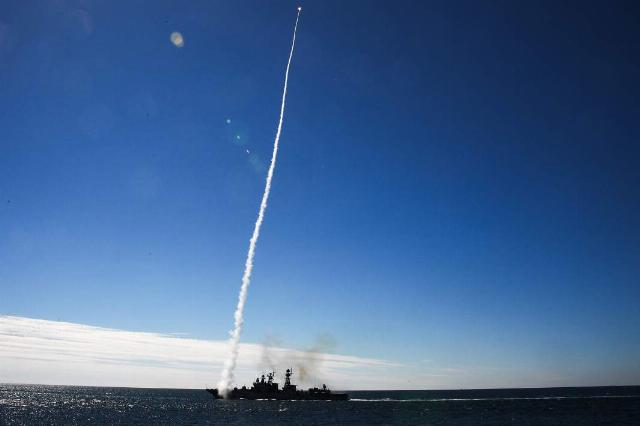
Firing of the Dagger anti-aircraft missile system
Image source: Photo: RIA Novosti/Vitaly Ankov
In mid—September, the detachment entered the northern part of the Pacific Ocean - the Bay of the Cross of the Bering Sea. While there, he took part in the Ocean-2024 exercises. There his ships acted as the enemy of our main forces. The coastal missile units, armed with the Bastion complex, transferred from the Petropavlovsk-Kamchatsky area, "worked out" for the detachment.
In addition, the forces of the detachment conducted an amphibious operation on the Chukchi Peninsula near Cape Vankarem. After that, the ships turned around and began their journey home.
In the area of Wrangel Island, the ships were escorted by the icebreaker Ural. He was supposed to help overcome the ice fields, the probability of which in the fall in this area is quite high.
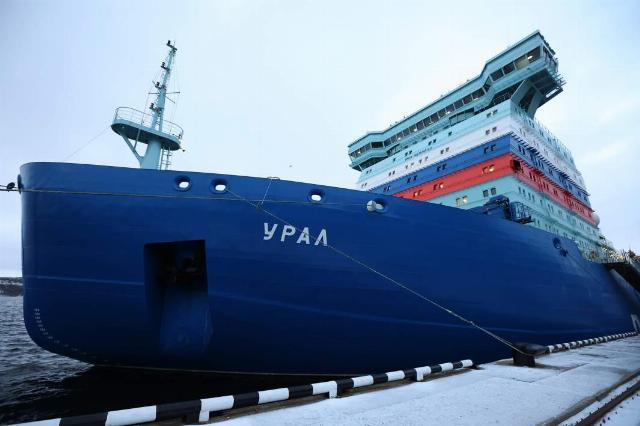
Icebreaker "Ural"
Image source: Photo: RIA Novosti/Pavel Lvov
As a result, the grouping of ships of the Northern Fleet traveled 11 thousand miles in 78 days, covering the waters of all the Arctic seas — from the Barents to the Bering Sea.
Actions to protect the Northern Sea Route
The importance of such trips is due to the role played by the Northern Sea Route in the country's economy, ensuring its sovereignty over the special economic zone in the Arctic, Admiral Sergei Avakyants, ex-commander of the Pacific Fleet, told Izvestia.
— During them, actions for the future are being worked out to ensure the security of the Northern Sea Route, control and ensure the security of the state border in the surface and underwater environment, — he noted. — The special economic zone and the Arctic sector are also being monitored. It is very important. These trips gain experience in sailing the polar seas of the Arctic Ocean, which have their own very complex specifics. This is a job for the future.
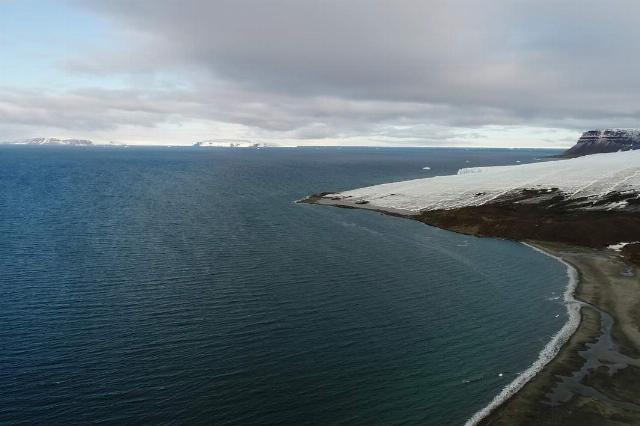
Photo: RIA Novosti/Ilya Timin
Image source: iz.ru
The Admiral noted that such campaigns are especially relevant now.
— Countries unfriendly to Russia declare their claims to the Arctic, — Sergey Avakyants emphasized. — In particular, they are making far-reaching plans for our economic zone and the Northern Sea Route. In this situation, it is very important to work ahead of the curve and have enough forces to ensure the security of the NSR and our sovereignty over the Arctic region. Only the Russian Navy can solve this problem.
The Russian Navy is largely isolated — this is a geographical given, military expert, Captain of the first rank Vasily Dandykin told Izvestia.
"The Northern Fleet operates in the Arctic, the Pacific Fleet operates in the Pacific Ocean, the Baltic and Black Sea Fleets are isolated in their own way in the seas of the same name," he recalled. — The Northern Sea Route is important to us for the reason that it allows us to maneuver forces between the Northern and Pacific Fleets. The transfer of forces between fleets, their concentration, and familiarization of crews with new theaters of military operations are indispensable for our Navy. And Arctic hiking plays a very important role here. We need to continue them.
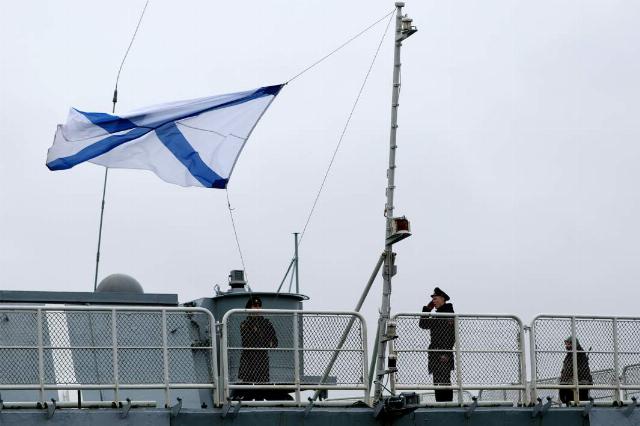
Photo: RIA Novosti/Dmitry Dubov
Image source: iz.ru
The expert recalled that all long-distance trips play an important role in the combat training of the fleet.
— Historically, sailors were taught at sea in Russia, — he noted. — This is a normal practice. A pilot cannot live without air, but a sailor cannot live without the ocean. Any long-distance trip is important from the point of view of training ship crews.
The value of the Northern Sea Route
Many countries are showing interest in participating in the development of the Arctic region today. It is fueled by the fact that promising deposits of minerals, including oil and gas, have been found on the shelf of the Arctic Ocean. The retreating ice has freed up the waters of the Northern Sea Route, making it commercially attractive — it is much shorter and more profitable than other routes between Asia and Europe.

Photo: RIA Novosti/Maxim Bogodvid
Image source: iz.ru
In the future, it will be able to transport up to half of the total volume of Euro-Asian cargo worth hundreds of billions of dollars. At the same time, the Northern Sea Route is a historically formed Russian transport artery.
In recent decades, Russia has been actively developing infrastructure in the Arctic and deploying forces to cover the NSR. The Bal and Bastion coastal missile systems, as well as air defense systems, are located on the northern islands. The polar airfields have been reconstructed, where fighters began to be on duty.
The transfer of forces to the Arctic from other regions is being worked out. In particular, the ships of the Northern Fleet trained amphibious landings along the Northern Sea Route during the maneuvers. Units of the Marine Corps and Arctic motorized infantry were involved in these exercises.
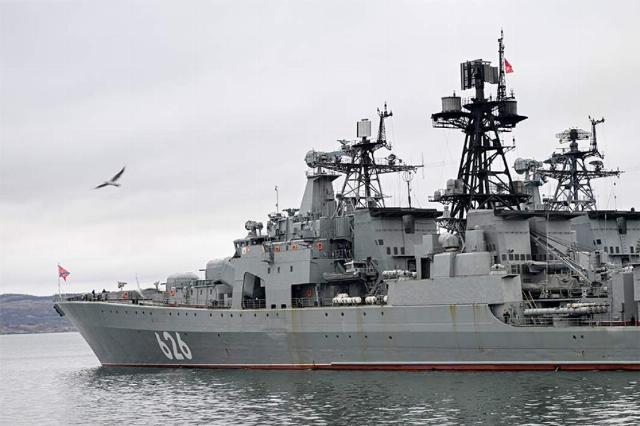
Photo: TASS/Lev Fedoseev
Image source: iz.ru
Izvestia's help
The first Arctic campaign took place between September 12-28, 2012. It was made by the Peter the Great TARKR, which traveled about 4 thousand nautical miles in the waters of the Barents, Kara and Laptev Seas. In the Kara Sea, the cruiser became part of a detachment of ships and vessels that included the BOD Vice Admiral Kulakov and Admiral Chabanenko, the BDK Alexander Otrakovsky and the rescue tugs Pamir and Altai.
The second campaign took place on September 3 – October 1, 2013. TARKR "Peter the Great", BDK "Olenegorsky miner" and "Kondopoga" participated in it. They have traveled more than 4 thousand nautical miles, performing tasks in the Laptev, Kara and Barents seas. For the first time in the history of Russia, a unique operation was carried out in the Arctic, in which the entire domestic nuclear surface fleet was involved to jointly solve a common task: the heavy nuclear missile cruiser of the Northern Fleet Peter the Great and four nuclear icebreakers of the Rosatom State Corporation — Yamal, Vaigach, 50 Years of Victory andTaimyr". Icebreakers provided escort for a detachment of ships and vessels in the most difficult ice conditions in the Matissen Strait and on the approaches to the Vilkitsky Strait.
In addition to the above-mentioned warships, the detachment included the marine tugboat MB-100, the kilector vessels KIL-164, KIL-31 and Alexander Pushkin, the rescue tugboat Pamir, the tanker Dubna and the auxiliary vessel Pechora. The detachment also delivered Boiler personnel, equipment and weapons to the island for the 99th tactical group being created and the restoration of the Temp airfield.
The third campaign took place on September 6 – October 9, 2014. The detachment consisted of the BOD Admiral Levchenko, the BDK Georgy Pobedonostets and Kondopoga, the tanker Sergei Osipov, the rescue tugboat Pamir and the keel vessel Alexander Pushkin. They have passed more than 4 thousand. They twice overcame areas with difficult ice conditions on the border of the Kara Sea and the Laptev Sea, accompanied by nuclear icebreakers of the Rosatom State Corporation. Supplies were delivered to the base on Kotelny Island (99th Tactical Group). Missile firing by the Rubezh and Pantsir-S1 complexes and exercises of warships and the 99th tactical group for the protection of the Arctic island zone and the sea coast were conducted.
The fourth campaign took place on August 16 – October 10, 2015. It was carried out by the BOD Severomorsk, the BDK Kondopoga and Georgy Pobedonostets, the kilectors KIL-164 and Alexander Pushkin, the tanker Sergei Osipov and the rescue tug Pamir. Arctic units and marines conducted exercises on the protection and defense of industrial facilities on the Taimyr Peninsula.
The fifth campaign took place on August 30 – October 7, 2016. The squadron of ships included the BOD "Vice Admiral Kulakov", the BDK "Kondopoga", the rescue tugboat "Pamir", the kilector "KIL-164", the armament transport "Akademik Kovalev", the tanker "Dubna" and the hydrographic vessel "Vizir". During the campaign, about 9 thousand miles were covered in the waters of the Barents, Kara and Laptev Seas.
For the first time, the ships of the Northern Fleet met in the Arctic with the ship of the Pacific fleet of the BOD Admiral Panteleev, with which they conducted joint exercises. Also, for the first time in one campaign, a detachment of ships and support vessels of the Northern Fleet successfully completed tasks on the island territories of four Arctic archipelagos: on the Novosibirsk Islands, on Severnaya Zemlya, on Franz Josef Land and on Novaya Zemlya.
The sixth campaign took place on August 10 – October 4, 2017. It was attended by the BOD Severomorsk, the BDK Alexander Otrakovsky, Kondopoga and George Pobedonostets, the kilector vessel KIL-164, the tanker Sergei Osipov, the hydrographic vessel Senezh and the rescue tug Pamir. The detachment traveled more than 6 thousand nautical miles to the Novosibirsk Islands in the Laptev Sea through the waters of the Barents and Kara Seas, as well as along the Yenisei River to the port of Dudinka. Exercises on the protection and defense of industrial facilities in the Arctic were conducted by the forces of the 80th Arctic Brigade and units of the Airborne Forces and special forces. Four amphibious operations have been carried out. For the first time, heavy equipment was landed at Cape Chelyuskin, the northernmost point of the Eurasian continent. For the first time in the history of the BPC Severomorsk, it entered the port of Dudinka.
The seventh campaign took place between August 8 and October 16, 2018. The detachment included the BOD "Vice Admiral Kulakov", the BDK "Alexander Otrakovsky" and "Kondopoga", the minesweeper "Vladimir Gumanenko", the icebreaker "Ilya Muromets", the tanker "Sergey Osipov", the rescue tug "Pamir" and the keel-143 keel vessel. The detachment has traveled more than 9 thousand nautical miles. During the campaign, the ships and vessels reached the waters of the Pacific Ocean and took part in the Vostok-2018 exercises, which included a bilateral Arctic security exercise in Chukotka, as well as a rescue operation in the Bering Strait and the Bering Sea.
The eighth campaign took place on August 5 – September 29, 2019. The detachment included the BOD "Vice Admiral Kulakov", the BDK "Alexander Otrakovsky" and "Kondopoga", the rescue tugboat "Pamir", the tanker "Sergei Osipov" and the icebreaker "Ilya Muromets". They traveled more than 5,600 miles along the Northern Sea Route, visiting the Arctic archipelagos of Novaya Zemlya, Severnaya Zemlya and Franz Josef Land, as well as the Taimyr Peninsula.
The ninth cruise took place between August 5 and October 25, 2020, consisting of eight ships and vessels: BOD "Severomorsk", BDK "Alexander Otrakovsky" and "Kondopoga", the minesweeper "Vladimir Gumanenko", the rescue tugboat "Pamir", the tanker "Sergey Osipov", the kilector vessel "KIL-143" and the icebreaker "Ilya Muromets". Ships and vessels have traveled more than 8 thousand nautical miles along the entire route of the Northern Sea Route to the Bering Sea and back. For the first time in the history of Arctic campaigns, the group rounded the Severnaya Zemlya archipelago from the north.
The tenth campaign took place on August 10 – October 11, 2021. It was carried out by the BOD Severomorsk, the BDK Georgy Pobedonostets, the tanker Sergei Osipov and the rescue tugboat Pamir. 12 thousand nautical miles were covered, a number of exercises were conducted in the waters of the Barents and Kara Seas and in the Laptev Sea, as well as in the port of Dudinka and in the area of the Yakut village of Tiksi.
The eleventh campaign took place on August 10 – October 10, 2022. The squadron of ships included the BOD Admiral Levchenko, the BDK Alexander Otrakovsky, the tanker Sergei Osipov and the rescue tug Pamir. During the cruise, the ships traveled more than 9 thousand nautical miles across the Arctic seas and the Yenisei. The landing was made at Cape Chelyuskin.
The twelfth campaign took place on August 10 – October 12, 2023. It was attended by the BOD "Vice Admiral Kulakov", the BDK "Alexander Otrakovsky", the tanker "Sergei Osipov" and the rescue tug "Altai". During it, more than 10 thousand miles were covered. The geography of the exercises covered the waters of the Arctic seas from the Franz Josef Archipelago to the Novosibirsk Islands.
Dmitry Boltenkov
Bogdan Stepovoy
Andrey Fedorov
